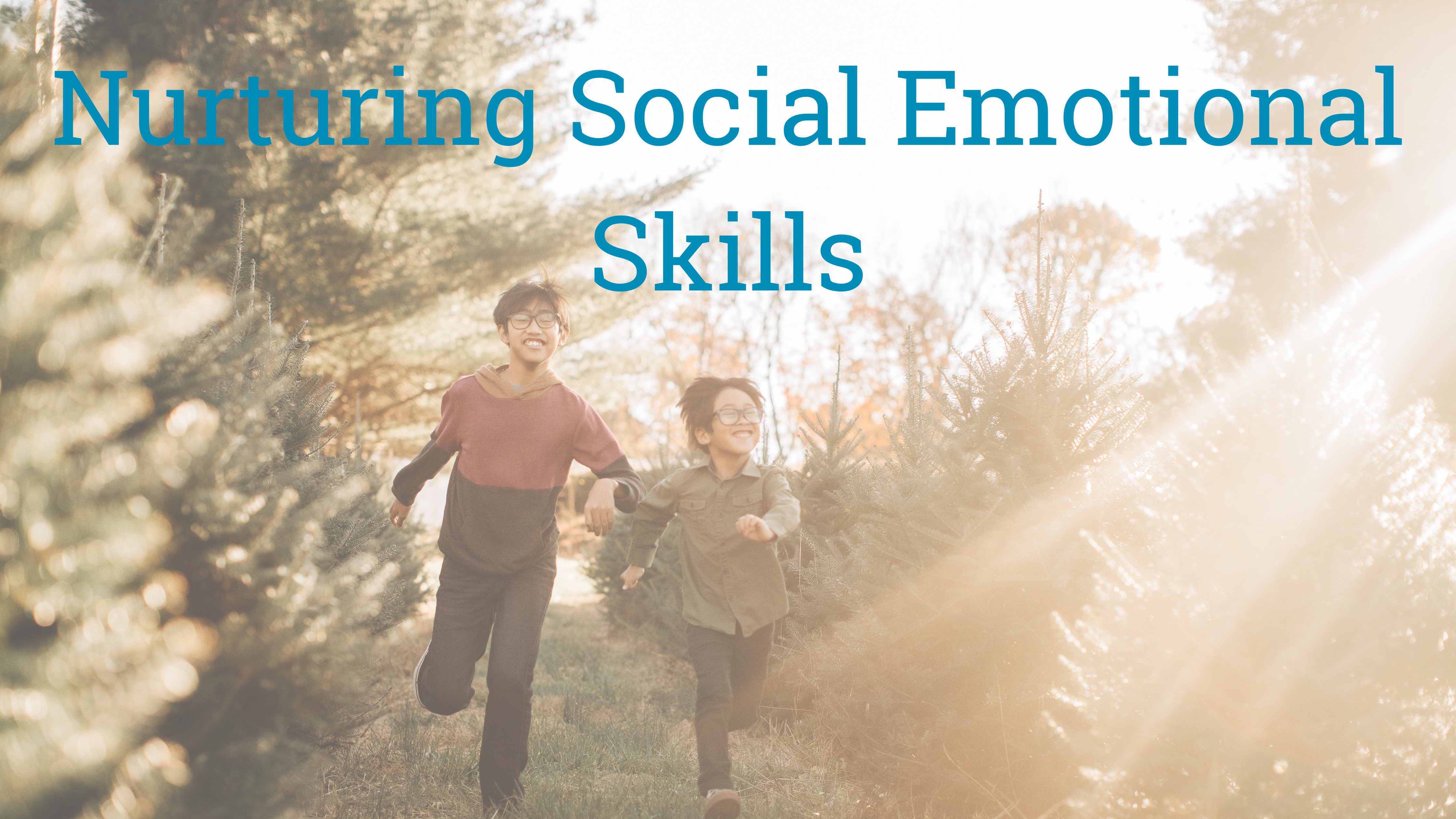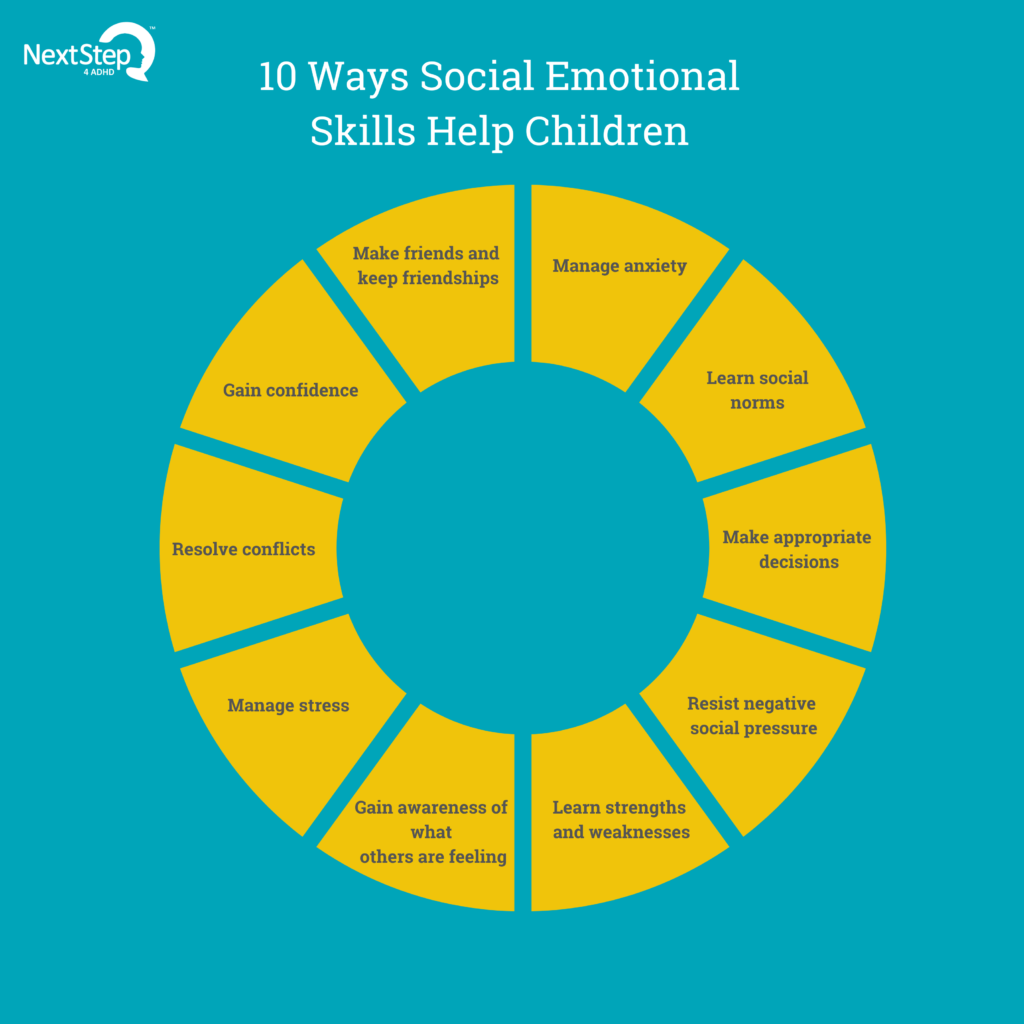
What Are Social Emotional Skills and How Do You Nurture Them?
Children with ADHD may struggle with social skills, but thankfully, social emotional skills can be developed. This means that there are many ways to continue to nurture these skills at home.
What Are Social Emotional Skills?
Social emotional skills help us connect to others. Social emotional development begins at birth; babies start learning how to connect to others from the very beginning. As babies and children continue to develop these skills, they’ll eventually use this skill set to:
- Manage emotions
- Build healthy relationships
- Feel empathy
Here are three examples of social emotional skills:
- A child recognizes that his friend is sad, and then he asks if they’re ok
- A child learns to express himself differently depending on his audience: friends, teachers, or parents, etc.
- You understand your own thoughts and feelings, and you can use this information to relate to others
Developing social emotional growth takes time. Even though social emotional development starts in infancy, it continues into and throughout adulthood. Early interactions with family, caregivers, and friends have the biggest impacts on development, but every new interaction (whether that’s meeting a new co-worker or raising a child) continues to shape our social emotional growth.
Why Social Emotional Skills Matter
Children with well-developed social-emotional skills are more likely to excel in school — and later in their career. Social-emotional skills help kids in many ways.

ADHD and Social Emotional Skills
Children (and adults for that matter) with ADHD may struggle with social emotional skills. According to a study published in the journal Child and Adolescent Psychiatry and Mental Health, children with poor social emotional skills are more likely to miss school days.
Social emotional skills are developed when children witness the social world – and that includes both online or in person – but how can these skills be further shaped? Here are a few strategies for sharpening your child’s skill set at home:
1. Model the Language
Sometimes talking through things out loud can help model the language that supports social emotional skill growth. Here are a few examples:
- Validate any struggles that your child has and express empathy (e.g., “That must be hard” or “I hear you.”)
- Use reflective listening when your child expresses any social or emotional difficulties (this helps them feel heard)
- Repeat or reiterate what your child says to demonstrate that you understand their feelings accurately (e.g. “I am sad that you feel lonely.”)
You can learn more phrases to use here in this post about growth mindset.
2. Reflect on Social Settings
You can engage your child in conversations about social settings. This includes social settings in TV shows or social settings in online environments too. Your child can continue to grow and develop social skills in online classes and multi-player collaborative video games.
The following questions can promote social emotional growth:
- What’s going on in the class/game/group?
- What are the unspoken rules? How do you know that these are the rules?
- What do you find interesting about this class/game/group?
- What do you know about these people (classmates/other players)?
- Who is in this group/game/class?
- How do you step into other player’s shoes?
- How do you react to other players’ messages and/or behaviors?
- How is everyone else behaving, and how do you compare?
If you’re watching a TV show together, you can ask similar questions and use the show as an opportunity to talk about interpersonal relationships with others.
3. Practice Building Friendships
Making friends is not passive, and the process can be made even more difficult when schools are virtual and social outings aren’t as frequent as they used to be. Making friends requires:
- Meeting someone
- Learning about them (their likes, dislikes, etc.)
- Engaging in small talk
- Engaging in one-on-one activities like playdates
Social distancing has made this process much more difficult. You can help your child practice building friendships through:
Practicing Small Talk
Your child can engage in small talk at the dinner table with family. Small talk is one of the key building blocks of starting a friendship, and it also helps strengthen active listening. In addition to practicing small talk at dinner, you may suggest that your child engages in small talk with other classmates (when appropriate; some virtual classes make use of breakaway groups, which is a good opportunity to practice small talk). You might also suggest that your child calls a cousin or other family member to practice small talk over the phone.
Playing with Puppets
For younger children, playing with puppets can be a great way to work on social emotional skills. Puppet play can introduce your child to emotional words (e.g., happy, angry, sad) while allowing your child a way to talk about and work through problems.
4. Try Thinking Out Loud
Parents can model problem solving and emotional regulation skills by talking through their own problems out loud. For example, you might say out loud: “Oh no! My favorite shoes have a hole in them. I’d better wear a different pair today so my feet don’t get wet from the rain.” This helps to model appropriate ways to deal with frustration.
5. Make Time for Bedtime Stories
Bedtime stories aren’t just for relaxing your child and helping them fall asleep. Reading to your child can enhance his or her vocabulary, improve language skills, and boost emotional regulation. You can help your child develop social emotional skills by talking about the story. Ask:
- What should the character do?
- How do you think this character feels?
- What would you do if you were in this character’s position?
6. Plan a Game Night
Game nights are fun, but they also help support social emotional skills too. Games — including both board games and outdoor play games — teach children how to take turns, how to cooperate with others to reach a common goal, how to cope with frustrations, and how to enjoy playing even if you’re not winning.
Social Emotional Development and ADHD: Take Your Next Steps
Are you searching for more strategies to help your child? In addition to nurturing social emotional skills at home, your child may benefit from professional care.
We’re proud to offer a multidisciplinary and holistic approach to you and your child’s mental health needs. Our team of providers are experts when it comes to effective medication management, parent coaching, and positive parenting strategies to motivate and encourage children with ADHD.
To make an appointment, call us at 502-907-5908. You can also request an appointment here.
Learn More